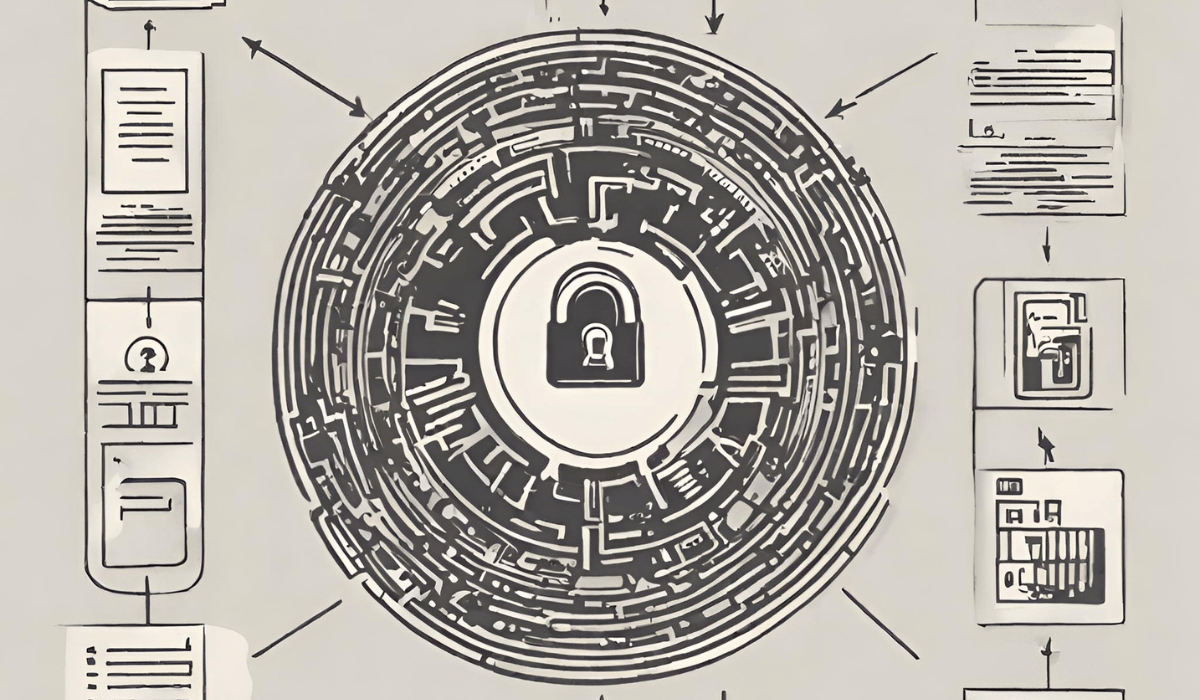Introduction
The Role Of Encryption In Data Security
Facebook is one of the largest social media platforms with over 2.96 billion active users worldwide. The company has been under scrutiny for its data privacy and security practices in recent years, particularly after the Cambridge Analytica scandal in 2018. In response to these concerns, Facebook has implemented various security measures, including encryption.
Encryption is a process that converts information or data into code to prevent unauthorized access during transmission or storage. Facebook uses end-to-end encryption for its messenger service, which means that only the intended recipient can access the messages sent between them. This feature ensures that even if someone intercepts the message during transmission or gains unauthorized access to Facebook’s servers, they will not be able to read it.
In addition to end-to-end encryption, Facebook also uses other encryption methods such as Transport Layer Security (TLS) and Secure Sockets Layer (SSL) protocols for secure communication between web browsers and servers. These measures ensure that all user data is encrypted when it travels across networks and when stored on Facebook’s servers.
Understanding Encryption
What is encryption?

Encryption is a method of encoding data in such a way that only authorized parties can access it. The process involves using an algorithm or cipher to scramble the original plain text into an unintelligible form, known as ciphertext. The only way to decipher the message back into its original form is through the use of a decryption key, which only authorized parties to possess.
Types Of Encryption Methods

There are various types of encryption methods used to protect sensitive information from unauthorized access. The most common encryption methods include symmetric key encryption, asymmetric key encryption, and hashing algorithms. Symmetric key encryption uses the same secret key for both encrypting and decrypting data. Asymmetric key encryption involves using a public-private key pair where the public key is used for encrypting data while the private key is used for decrypting it. Hashing algorithms convert plaintext into unique fixed-length values that cannot be reversed to obtain the original message.
The Role Of Encryption On Facebook
How Encryption Protects User Data On Facebook?
Facebook uses a strong encryption method to protect user data. All data exchanged between the user’s device and the Facebook server is encrypted using HTTPS (Hypertext Transfer Protocol Secure). This means any information being transmitted over the internet is scrambled so that if someone were to intercept it, they wouldn’t be able to read or understand it; only those with the proper decryption key can access this information.
Additionally, end-to-end encryption is used for sensitive communications such as messages sent through Messenger. End-to-end encryption ensures that only the sender and recipient can view the message, even Facebook cannot see what is being sent. This type of encryption also protects users from hacking attempts because even if hackers were to gain access to Facebook’s servers, they wouldn’t be able to view encrypted messages.
Facebook also relies on multi-factor authentication techniques where users must enter two or more pieces of evidence before logging into their accounts. For example, after entering their password, users may need to provide a security code sent via text message or generated by an authenticator app on their phone. This makes it much harder for attackers who have stolen passwords or login details through phishing attacks since they would still require additional information before gaining access.
Facebook’S Data Collection Methods
The Types Of Data Facebook Collects
The social media giant collects a vast amount of user data, which includes personal information such as name, email address, date of birth, and location. Facebook also collects user activity on the platform, including likes, comments, and shares.
Additionally, Facebook tracks users’ browsing behavior through the use of cookies and other tracking technologies. This allows them to show targeted ads based on users’ interests and online activities. Moreover, Facebook also collects data from third-party websites that use their services such as the “like” button or Facebook Login feature.
How Facebook Collects User Data?
When a user creates an account, they provide personal information such as their name, age, email address, and location. Facebook also tracks users’ activities on the platform, including posts they like or comment on and pages they visit. In addition, Facebook collects data from other sources such as third-party websites and apps that use its advertising services.
The Risks Of Facebook Data Collection
The Potential Misuse Of Data By Facebook
Facebook does encrypt some user data, such as passwords and payment information. However, other types of sensitive information like messages are not end-to-end encrypted by default. This means that third-party apps or individuals with enough knowledge can potentially access these communications. Additionally, there is concern about how Facebook may use this data for targeted advertising or share it with third parties without users’ consent.
Despite public scrutiny over their privacy policies, it remains unclear just how to secure Facebook’s encryption methods. With new reports emerging frequently about cyberattacks and data breaches on the platform, many users remain skeptical about trusting their personal information to social media giants like Facebook. As such, more transparency around its security measures will be key in rebuilding trust among users who may otherwise be reluctant to engage with the platform at all moving forward.
The Risks Associated With Targeted Advertising
Targeted advertising can lead to the collection of large amounts of personal data, which can then be used for nefarious purposes. This is particularly true in the case of social media giants like Facebook, which have access to an enormous amount of user data.
Another risk associated with targeted advertising is the potential for discrimination. Advertisers can use demographics and other criteria to target specific groups of people, but this also means they could exclude certain individuals based on factors such as race or gender. This type of discrimination can be difficult to detect and prevent, making it a significant challenge for regulators and policymakers.
The Encryption Debate
The Controversy Surrounding Facebook’S Encryption Policies
Facebook has been in the spotlight for the controversy surrounding its encryption policies. While it’s true that Facebook encrypts data, many critics argue that it doesn’t do enough to protect user privacy. Experts suggest that it could also become a haven for cybercriminals and terrorists who use social media as a tool for recruitment and propaganda.
Moreover, there are concerns about how Facebook uses encrypted data to its advantage. Critics claim that Facebook uses encrypted data to mine users’ personal information without their consent or knowledge. This type of behavior undermines the very purpose of encryption – to protect users’ privacy and keep their information safe from prying eyes.
As such, calls for greater transparency and accountability continue to grow louder. Some lawmakers have even proposed legislation aimed at regulating tech companies like Facebook that rely on encryption technology to safeguard user data. It remains to be seen whether these efforts will lead to meaningful change or if they will be simply dismissed as yet another example of government overreach in an era where cybersecurity is more important than ever before.
The Impact Of Encryption On Government Surveillance
Encryption provides users with enhanced security and privacy, but governments have argued that it hinders their ability to investigate potential threats.
One high-profile example is the case between Apple and the FBI in 2016, where the FBI requested access to an encrypted iPhone belonging to one of the San Bernardino shooters. Apple refused, citing concerns over privacy and setting off a legal battle that eventually ended with the FBI finding another way into the phone.
Facebook’s End-to-End Encryption
How Facebook’s End-To-End Encryption Works?

Facebook’s end-to-end encryption is a method of securing data to ensure that only the sender and recipient can read the messages exchanged through Facebook Messenger. This encryption technique uses complex algorithms to scramble the message content so that it cannot be easily intercepted while in transit. Facebook implemented this feature as a way to protect user privacy and make sure that conversations are safe from prying eyes.
End-to-end encryption also means that even Facebook cannot access or read users’ conversations, making it more difficult for hackers or governments to gain access to sensitive information. This is because, with end-to-end encryption, messages are encrypted on the sender’s device before being sent and then decrypted on the recipient’s device after being received. Thus, no one else has access to the unencrypted message content during transmission.
The Benefits And Drawbacks Of End-To-End Encryption
One of the benefits of E2EE is that it ensures the privacy and confidentiality of user data, making it difficult for hackers or governments to access sensitive information. This level of protection is particularly important for online communications platforms, like Facebook Messenger, which handles billions of messages every day.
However, there are also some drawbacks to end-to-end encryption. For instance, because messages are encrypted end-to-end, they cannot be monitored by law enforcement agencies even when a warrant has been issued. This makes it more challenging for authorities to investigate crimes or prevent terrorist attacks. Additionally, as seen in recent controversies involving Facebook’s handling of misinformation and hate speech on its platform, E2EE can also make it harder for companies to monitor content and enforce their own policies.
The Challenges Of Encryption On Facebook
The Technical Challenges Of Encryption On Facebook
One challenge with encryption on Facebook is the sheer volume of data that needs to be encrypted. According to Facebook, over 2 billion people use the platform every month, generating massive amounts of data. Encrypting all of this data requires significant computing power and resources.
Another technical challenge with encryption on Facebook is balancing security with accessibility. While encryption makes it harder for hackers or other malicious actors to access users’ information, it also makes some features less accessible or even impossible. For example, if messages are end-to-end encrypted, they cannot be scanned for content by moderators or law enforcement agencies. Balancing these competing interests requires careful consideration and planning by Facebook’s technical teams.
The Impact Of Encryption On Facebook’S Business Model
Facebook’s business model relies heavily on collecting and utilizing user data to generate revenue through targeted advertising. The push for end-to-end encryption could have a significant impact on the platform’s ability to mine user data for advertising purposes.
While encryption provides users with greater privacy and security, it also limits Facebook’s access to user data. This means that the social media giant may not be able to track users’ activities as effectively as before, which could result in less accurate ad targeting. Additionally, encrypted messages cannot be scanned by Facebook’s automated moderation tools for harmful content like hate speech or misinformation.
Facebook is currently exploring ways to balance encryption with its business needs. One possible solution is developing innovative ways of analyzing encrypted data without actually decrypting it. It remains unclear how this will play out in terms of profitability but one thing is certain – a shift towards strong encryption would force Facebook to rethink its entire business model.
The Benefits And Drawbacks Of Facebook Encryption
The Benefits Of Encryption For Facebook Users
Encryption is one of the most effective ways to protect users’ data from being accessed by unauthorized people. Facebook uses encryption technology to ensure that messages, photos, videos, and other content shared by users are secured.
Encryption works by converting plain text into a code that can only be read with a key or password. This means that even if someone intercepts data as it’s transmitted between users, they won’t be able to access it unless they have the right key. As a result, encryption provides an extra layer of protection against hackers who might try to steal sensitive information such as passwords or credit card details.
In addition to protecting user data from cybercriminals, encryption also prevents Facebook itself from accessing user information. This ensures that your conversations and personal information remain private even from Facebook employees.
The Potential Drawbacks Of Encryption On Facebook
One of the most significant issues is that encrypted messages make it difficult for law enforcement agencies to access information during investigations. This could impede their ability to prevent or solve crimes, which has led to calls from some officials for backdoor access to encrypted messages.
Another potential drawback is that encryption can provide a false sense of security for users. While messages and data are protected from third-party interception, they may still be vulnerable to other threats such as malware or phishing attacks. Additionally, if a user’s account becomes compromised, the encryption measures in place will not prevent unauthorized access.
There is also the issue of content moderation. With end-to-end encryption in place, Facebook would not have access to the content of users’ messages and thus would be unable to monitor or remove inappropriate content such as hate speech or terrorist propaganda.
FAQs
What Data Does Facebook Collect From Its Users?
Facebook collects a vast amount of data from its users, ranging from personal information such as name and birthdate to behavioral data like browsing history and search queries. The company claims that this data is encrypted while in transit, meaning that it can’t be intercepted by unauthorized third parties. However, Facebook admits that they analyze user content (such as posts, comments, and messages) using automated tools to improve their services and target advertising.
What Are The Risks Associated With Facebook’S Data Collection Methods?
One of the biggest risks associated with Facebook’s data collection methods is that the platform collects an enormous amount of data on its users, including personal information such as names, addresses, and phone numbers. This information can be used for targeted advertising or sold to third-party companies without the user’s knowledge or consent.
Moreover, there have been concerns about how Facebook uses this data to influence user behavior by showing them ads or content that aligns with their preferences or interests. The recent Cambridge Analytica scandal highlighted these risks when it was revealed that the political consulting firm had harvested millions of Facebook users’ personal data without their permission to influence voter behavior during the 2016 US presidential election.
Another risk associated with Facebook’s data collection methods is that hackers can potentially gain access to users’ personal information and use it for malicious purposes such as identity theft, fraud, and phishing scams.
What Is Facebook’S Encryption Roadmap, And How Will It Affect User Privacy?
In 2020, Facebook announced its plans to implement end-to-end encryption across its messaging platforms including Messenger and Instagram Direct. This move is aimed at improving user privacy by ensuring that only the sender and recipient of a message can access it.
Facebook’s encryption roadmap has been met with mixed reactions from stakeholders including government agencies who are concerned about their ability to access communications for surveillance purposes. However, Facebook maintains that implementing end-to-end encryption will not compromise national security efforts as it has worked out a way to identify harmful content without compromising users’ privacy.
Conclusion
Facebook does encrypt some of its data, but not all. Data in transit is encrypted using HTTPS protocol to protect information exchanged between the user and Facebook servers. This includes login credentials, messages, and other personal information. However, Facebook’s end-to-end encryption feature is only available for Messenger’s secret conversations.
